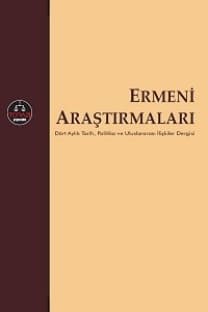1878-1879 ZEYTUN ERMENİ İSYANLARI VE İNGİLİZ SAİD PAŞA’NIN ALDIĞI TEDBİRLER
19. asırda Halep vilayeti dâhilinde Ermenilerin en yoğun yaşadığımerkezlerden birini Maraş sancağına bağlı Zeytun kazası oluşturuyordu.Sarp coğrafi konumu dolayısıyla bir çeşit feodal yapıya bürünmüş olanZeytun, İşhan denilen yerel beyler tarafından idare edilmekteydi. Zeytun’undağlık konumu, şehir ve merkezlere uzaklığı, Osmanlı Devleti’nin sondöneminde kanun ve düzenden kaçanların toplandığı yer haline gelmesinesebep olmuştu. Bu yapısı nedeniyle Zeytun’da vergi ve çeşitli sebepleredayanan bir düzine isyan silsilesi görüldü.Bu bağlamda 1877-1878 Osmanlı-Rus savaşı sonu ile Berlin Konferansı sırasında ve 1879 yılında Zeytun’da iki Ermeni isyanı çıktı. Osmanlı hükümetinin bu isyanları bastırmak için tayin ettiği görevlilerin İngilizler tarafından şikâyet konusu edilmesi üzerine Said Paşa bölgeye gönderildi. Uzun yıllar İngiltere’de eğitim görmüş olmasından ötürü “İngiliz Said” namıyla anılan Paşa, meseleyi daha da alevlendirmemek ve Büyük Devletlerin müdahalesine fırsat vermemek maksadıyla isyancılar için af ilan etti ve Zeytun’da bazı ıslahatlar uyguladı. Diğer yandan Said Paşa, Zeytun’daki durumu, isyanın sebeplerini gözlem ve tahlillerini, tahkikat raporlarını ve Bâbıâli ile cereyan eden yazışma suretlerini “Jurnal” adını verdiği günlüğüne aynen kaydetti.
Anahtar Kelimeler:
Zeytun, Armenian Revolt, İngiliz (Eğinli) Said Paşa, İngiltere, Mr. Hendirson
(1878-1879 ARMENIAN REVOLTS IN ZEYTUN AND SAID PASHA THE ENGLISHMAN’S PRECAUTIONS)
In the 19thcentury, Zeytun (Zeitun) was housing a large numberof the Armenian population in sanjak of Marash, a sub-province of AleppoVilayet. Zeytun was a rough, rugged town; therefore it was administrated insort of a feudal system by local lords, known as “Ishans”. Zeytun’smountainous location and its remoteness of city and centers caused it to bea meeting point for outlaws and criminals in the last decades of the OttomanEmpire. As a result of these circumstances, dozens of uprisings have occurredin Zeytun in response to taxation issues and other reasons. In this context, Zeytun witnessed two Armenian rebellions at end of the RussoOttoman War of 1877-1878 and during the Congress of Berlin, as well as in1879. The Ottoman government appointed officers for suppressing the riots inthe district. However, their practices were continuously criticized, by GreatBritain and complained to the Ottoman government. Ultimately, Said Pasha theEnglishman who had studied in Great Britain for a long time, was appointedto subside the rebellions. Said Pasha proclaimed amnesty for rioters andimplemented reforms in Zeytun in order to calm the issue and disallow theintervention of Great Powers. Moreover, Said Pasha took notes in his diary,named Jurnal. He wrote his observations and analysis about Zeytun and alsodocumented the reasons for the uprisings. In addition, he copied to his dairythe investigation reports of Zeytun and dispatches sent from the Sublime Porte
Keywords:
Zeytun, Armanian Revolt, Said Pasha the Englishman, GreatBritain, Mr. Hendirson,
- ISSN: 1303-068X
- Yayın Aralığı: Yılda 2 Sayı
- Başlangıç: 2001
- Yayıncı: Avrasya İncelemeleri Merkezi
Sayıdaki Diğer Makaleler
ERMENİ KÜLTÜRÜ VE ERMENİ PROPAGANDASI
SOĞUK SAVAŞ SONRASI ERMENİSTAN-İRAN İLİŞKİLERİ: GELİŞEN VE DERİNLEŞEN BAĞLAR
"ALMAN BELGELERİ ERMENİ SOYKIRIMI 1915-16"
DİASPORA VE DIŞ POLİTİKA: TÜRKİYE-ERMENİSTAN İLİŞKİLERİNDE DİASPORANIN ROLÜ
1878-1879 ZEYTUN ERMENİ İSYANLARI VE İNGİLİZ SAİD PAŞA’NIN ALDIĞI TEDBİRLER
"ALMAN BELGELERİ ERMENİ SOYKIRIMI 1915-16"
TÜRK’Ü “ÖĞRETMEK”: ERMENİ TARİH DERS KİTAPLARINDA TÜRK İMGESİ
